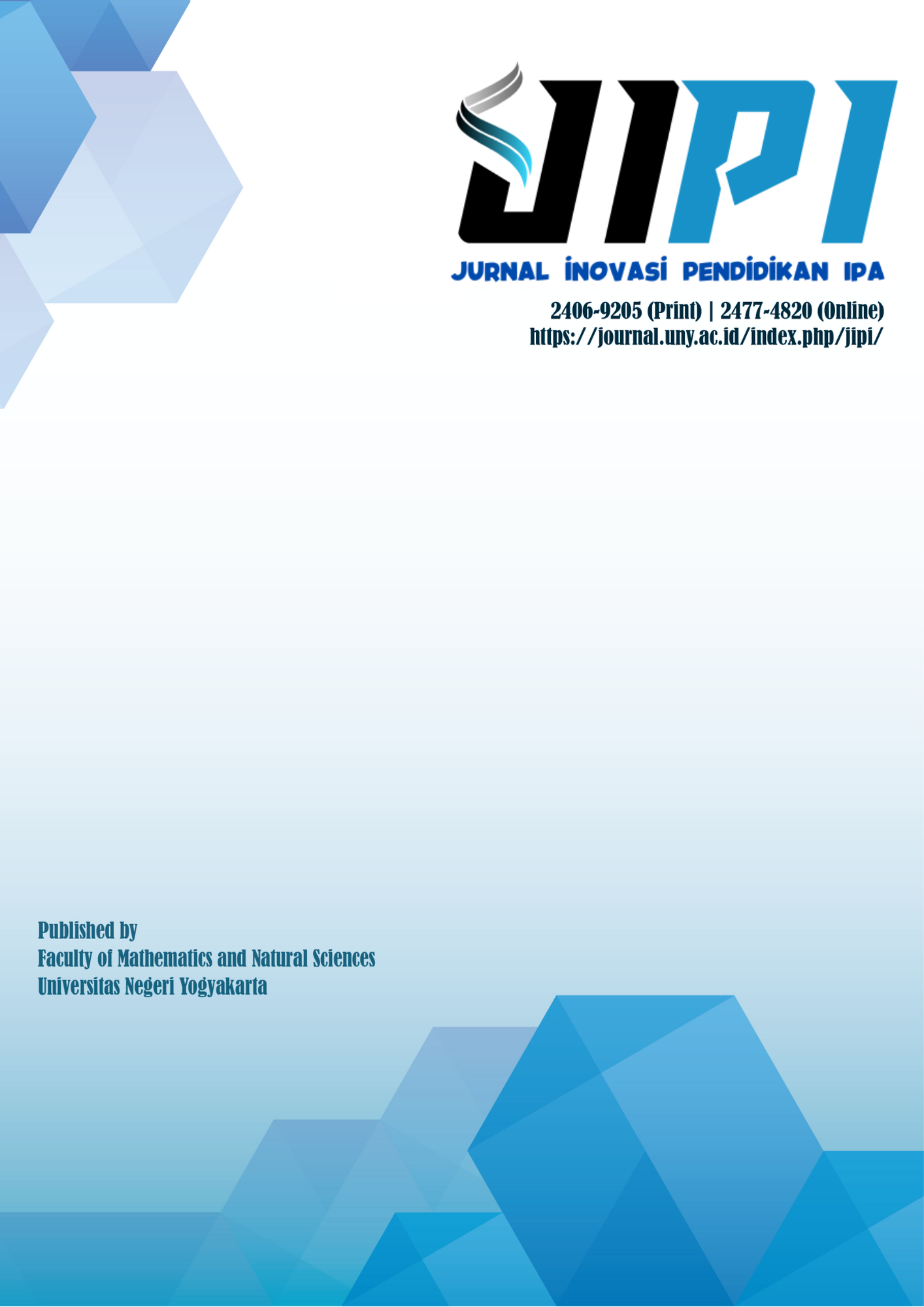Evaluating pre-service science teachers' concept mastery in the topic of biodiversity during distance learning under circumstance of Covid-19 pandemic
DOI:
https://doi.org/10.21831/jipi.v6i2.35033Keywords:
biodiversity, concept mastery, covid-19 pandemic, distance learningAbstract
References
Afandi, A., Sajidan, S., Akhyar, M., & Suryani, N. (2019). Development frameworks of the indonesian partnership 21st-century skills standards for prospective science teachers: A Delphi study. Jurnal Pendidikan IPA Indonesia, 8(1), 89–100. https://doi.org/10.15294/jpii.v8i1.11647
Arulogun, O. T., Akande, O. N., Akindele, A. T., & Badmus, T. A. (2020). Survey dataset on open and distance learning students' intention to use social media and emerging technologies for online facilitation. Data in Brief, 31, 4–11. https://doi.org/10.1016/j.dib.2020.105929
Badriyah, N. L., Anekawati, A., & Azizah, L. F. (2020). Application of PjBL with brain-based STEAM approach to improve learning achievement of students. Jurnal Inovasi Pendidikan IPA, 6(1), 88–100. https://doi.org/10.21831/jipi.v6i1.29884
Costa, P. D. da, & Araujo, L. (2018). Quality of teaching and learning in science. In Joint Research Centre (JRC). https://doi.org/10.2760/8605
Fratiwi, N. J., Utari, S., & Samsudin, A. (2019). Study of concept mastery of binocular K-11 students through the implementation of A multi-representative approach. International Journal of Scientific and Technology Research, 8(8), 1637–1642.
Glaze, A. L. (2018). Teaching and learning science in the 21st century: Challenging critical assumptions in post-secondary science. Education Sciences, 8(1), 1–8. https://doi.org/10.3390/educsci8010012
Goodsett, M. (2020). Best practices for teaching and assessing critical thinking in information literacy online learning objects. Journal of Academic Librarianship, 46(5), 102163. https://doi.org/10.1016/j.acalib.2020.102163
Gumilar, R. P., & Wardani, S. (2020). The implementation of guided inquiry learning models on the concept mastery, scientific attitud , and science process skill. Journal of Primary Education, 9(229), 148–154.
Jeong, J. S., & González-Gómez, D. (2020). Assessment of sustainability science education criteria in online-learning through fuzzy-operational and multi-decision analysis and professional survey. Heliyon, 6(8). https://doi.org/10.1016/j.heliyon.2020.e04706
Kí¶nig, J., Jäger-Biela, D. J., & Glutsch, N. (2020). Adapting to online teaching during COVID-19 school closure: teacher education and teacher competence effects among early career teachers in Germany. European Journal of Teacher Education, 43(4), 608–622. https://doi.org/10.1080/02619768.2020.1809650
Kumari, T. A., Hemalatha, C., Ali, M. S., & Naresh, R. (2020). Survey on impact and learning's of the online courses on the present era. Procedia Computer Science, 172, 82–91. https://doi.org/10.1016/j.procs.2020.05.167
Littenberg-Tobias, J., & Reich, J. (2020). Evaluating access, quality, and equity in online learning: A case study of a MOOC-based blended professional degree program. Internet and Higher Education, 47, 100759. https://doi.org/10.1016/j.iheduc.2020.100759
Mamun, M. A. Al, Lawrie, G., & Wright, T. (2020). Instructional design of scaffolded online learning modules for self-directed and inquiry-based learning environments. Computers and Education, 144(September 2019), 103695. https://doi.org/10.1016/j.compedu.2019.103695
Mí¼ller, K., Prenzel, M., Seidel, T., Schiepe-Tiska, A., & Kjí¦rnsli, M. (2016). Science teaching and learning in schools: theoretical and empirical foundations for investigating classroom-level processes. In Methodology of Educational Measurement and Assessment (Issue December, pp. 423–446). https://doi.org/10.1007/978-3-319-45357-6_17
Nugroho, R. A., & Suryadarma, I. G. P. (2018). Pengaruh servant leadership learning dengan concept mapping terhadap pemahaman konsep dan berpikir kritis siswa The effect of the servant leadership learning with concept mapping on the concept understanding and critical thinking students. Jurnal Inovasi Pendidikan IPA, 4(1), 114–127.
OECD. (2018). What 15-year-old students in Indonesia know and can do. Programme for International Student Assessment (PISA) Result from PISA 2018, 1–10.
Prabowo, S., Surjono, H. D., & Prabowo, M. (2020). Improving virus lesson mastery by using web-based learning media. Proceedings of the International Conference on Online and Blended Learning 2019 (ICOBL 2019), January. https://doi.org/10.2991/assehr.k.200521.033
Rahayu, N. (2017). Pengaruh pembelajaran dengan pendekatan inquiry terhadap penguasaan konsep dan scientific skill materi sistem pencernaan. Jurnal Inovasi Pendidikan IPA, 3(1), 70. https://doi.org/10.21831/jipi.v3i1.9888
Rapanta, C., Botturi, L., Goodyear, P., Guí rdia, L., & Koole, M. (2020). Online University Teaching During and After the Covid-19 Crisis: Refocusing Teacher Presence and Learning Activity. Postdigital Science and Education, 1–23.
Reimers, F., Schleicher, A., Saavedra, J., & Tuominen, S. (2020). Supporting the continuation of teaching and learning during the COVID-19 pandemic. In OECD.
Rosamsi, S., Miarsyah, M., & Ristanto, R. H. (2019). Interactive Multimedia Effectiveness in Improving Cell Concept Mastery. Journal of Biology Education, 8(1), 56–61. https://doi.org/10.15294/jbe.v8i1.28154
Rusilowati, A., N, S. E., & S., S. M. E. (2015). Developing of Science Textbook Based on Scientific Literacy for Seventh Grade of Secondary School. International Conference on Mathematics, 2015(Icmse), 42–45.
Rusli, R., Rahman, A., & Abdullah, H. (2020). Student perception data on online learning using heutagogy approach in the Faculty of Mathematics and Natural Sciences of Universitas Negeri Makassar, Indonesia. Data in Brief, 29, 105152. https://doi.org/10.1016/j.dib.2020.105152
Sadiqin, I. K., Santoso, U. T., & Sholahuddin, A. (2017). Pemahaman konsep IPA siswa SMP melalui pembelajaran problem solving pada topik perubahan benda-benda di sekitar kita. Jurnal Inovasi Pendidikan IPA, 3(1), 52. https://doi.org/10.21831/jipi.v3i1.12554
Saprudin, S., Liliasari, L., Setiawan, A., & Prihatmanto, A. S. (2020). Optical gamification (OG); Serial versus random model to improve pre-service physics teachers' concept mastery. International Journal of Emerging Technologies in Learning, 15(9), 39–59. https://doi.org/10.3991/ijet.v15i09.11779
Satriawan, M., Liliasari, S., & Setiawan, W. (2019). Wave energy concept mastery relate on creative thinking skills of the pre-service physics teachers in environmental physics lectures. Journal of Physics: Conference Series, 1157(3). https://doi.org/10.1088/1742-6596/1157/3/032044
Tamimiya, K. T., & Suryadarma, I. G. P. (2019). Potensi lokal Gunung Ijen untuk pemahaman konsep dan berpikir kreatif pengurangan resiko bencana. Jurnal Inovasi Pendidikan IPA, 5(1), 117–128. https://doi.org/10.21831/jipi.v5i1.25702
van Rensburg, E. S. J. (2018). Effective online teaching and learning practices for undergraduate health sciences students: An integrative review. International Journal of Africa Nursing Sciences, 9(July), 73–80. https://doi.org/10.1016/j.ijans.2018.08.004
Widiyawati, Y., & Nurwahidah, I. (2018). Elclivs berbasis inquiry untuk meningkatkan penguasaan konsep siswa tuna netra pada materi rangkaian listrik Elclivs-inquiry based to enhance visual impairment student conceptual understanding in electricity circuit topics. 4(2), 212–223.
Downloads
Published
How to Cite
Issue
Section
Citation Check
License
The authors submitting a manuscript to this journal agree that, if accepted for publication, copyright publishing of the submission shall be assigned to Jurnal Inovasi Pendidikan IPA (JIPI). However, even though the journal asks for a copyright transfer, the authors retain (or are granted back) significant scholarly rights.
Jurnal Inovasi Pendidikan IPA by http://journal.uny.ac.id/index.php/jipi/index is licensed under a Creative Commons Attribution-ShareAlike 4.0 International License.










